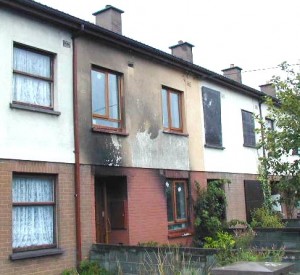2009-05-28: A week can be a long time in Ireland … during this last seven days, in particular, a time of harrowing emotions … horror, shame, disbelief, anger, pain, embarrassment … and relief that the truth has finally been revealed …
On Wednesday, 20th May 2009, at 14.30 hrs … the Report of the Commission to Inquire into Child Abuse was published at a launch, before a select audience, in Dublin’s Conrad Hotel. Victims of that child abuse and representative groups were barred, with the support of Gardaí, from attending.
Has anything really changed ?
The Commission was established on 23rd May 2000 … under the 2000 Commission to Inquire into Child Abuse Act (No.7 of 2000) … and given three primary functions:
– to hear evidence of abuse from persons who allege they suffered abuse in childhood, in institutions, during the period from 1940 or earlier, to the present day ;
– to conduct an inquiry into abuse of children in institutions during that period and, where satisfied that abuse occurred, to determine the causes, nature, circumstances and extent of such abuse ; and
– to prepare and publish reports on the results of the inquiry and on its recommendations in relation to dealing with the effects of such abuse.
The Chairperson of the Commission, Mr. Justice Seán Ryan, is a judge of the High Court.
The full Ryan Commission Report can be downloaded here … www.childabusecommission.com/rpt/pdfs/
Although Commission Recommendation No.5 (Volume IV, Chapter 7, Paragraph 7.06) states …
Childcare policy should be child-centred. The needs of the child should be paramount.
The overall policy of childcare should respect the rights and dignity of the child and have as its primary focus their safe care and welfare. Services should be tailored to the developmental, educational and health needs of the particular child. Adults entrusted with the care of children must prioritise the wellbeing and protection of those children above personal, professional or institutional loyalty.
[ Why is this critical Recommendation only in position ‘5’ ? Concerning the rights and dignity of children, why is the word ‘should’ used instead of ‘must’ ? ]
… none of the 20 Commission Recommendations refer directly to the 1989 United Nations (OHCHR) Convention on the Rights of the Child, which became an International Legal Instrument on 2nd September 1990 … and which Ireland signed on 30th September 1990, and later ratified on 28th September 1992.
The Convention has not yet been fully incorporated into Irish National Law. Why not ?
In relation to Ireland, the UN (OHCHR) Committee on the Rights of the Child observed the following in late 2006 …
” … the Committee regrets that some of the concerns expressed and recommendations made have not yet been fully addressed, in particular those related to the status of the child as a rights-holder and the adoption of a child rights-based approach in policies and practices.”
Some Comments & Questions …
1. The Hierarchy of the Roman Catholic Church in Ireland (with the notable exception of Dublin Archbishop, Dr. Diarmuid Martin), the Catholic Religious Orders and the Catholic Church generally … have lost their moral authority … and all credibility. If child abuse was deeply in-grained and systemic in Ireland’s institutions … what was happening in institutions run by the 18(?) Irish Religious Congregations in other countries ? What assets have been transferred out of Ireland by the 18(?) Irish Religious Orders since the year 2000 ?
2. The Irish Government Ministry having jurisdiction … the Department of Education … has been clearly shown to be criminally dysfunctional. What radical changes in its organization, policies, practices and procedures will be put in place following the Ryan Commission Report ? We also ask the same question of the Department of Health & Children !
Perhaps Unnoticed … Another Institution …
Reported in an article on Page 4 of The Irish Times (2009-05-21) … on the same day that the Commission to Inquire into Child Abuse published its findings … 20th May 2009 … the family of a six-year-old girl, Sarah Jinks, who died in a fire on 10th January 1999 at a local authority house in Sligo, secured €115,000 in settlement of their High Court Action alleging that Sligo County Council had negligently failed to maintain a safe electrical system in the house. During the Action, Sarah’s mother, Ms. Philomena Jinks, had claimed that the Council failed to respond with sufficient thoroughness to complaints about dangers in the house.
The ‘Real’ Institution Involved …
Let me place in the public domain some revealing background to a series of fatal fires at a local authority housing estate on the far side of the country from Sligo … and a Letter, dated 22nd September 2005, which we were forced to write to Bray Town Council, in County Wicklow …

Mr. Seán O’Neill,
Town Engineer,
Comhairle Baile Bhré,
Civic Offices,
Main Street,
Bray,
Co. Wicklow.
Re: Fire Safety Survey of Oldcourt Estate, Bray.
Mr. O’Neill,
In good faith, we submitted a Tender Proposal (copy enclosed with the original letter) for a Fire Safety Survey of the Oldcourt Housing Estate to you. As of today, we have had no communication, written or oral, from Bray Town Council.
We fully understood the critical need for this to be an authoritative, competent, comprehensive and entirely independent Fire Safety Survey. Our principal concern was that this must be shown to be so, especially to local residents. We remain uniquely qualified, in Ireland and Europe, to complete the special and unique task involved.
It was with complete shock, dismay and alarm, however, that we saw our Organization actually named in Media Reports of discussions which took place at the September Council Meeting in Bray.
As a matter of public record, we now wish to clarify a few issues …
1. We commenced our work on the basis that the Tender Documentation issued by Bray Town Council was unreliable. This we were only able to do because of our extensive experience with Local Authority Housing, and the ‘ways’ and ‘means’ of Local Authorities in Ireland.
2. The Department of the Environment, Heritage & Local Government (DEHLG) has been intimately involved – at every level – with the planning, costing, design and construction of Local Authority Housing in every part of Ireland – from our direct experience, since the mid-1980’s. The Department is, therefore, very far from being a Disinterested Party in the serious matters under examination at the Oldcourt Housing Estate. It was extraordinary to see a representative of the DEHLG on the Interview Panel.
3. The Members of the Tender Interview Panel may have been ‘experts’, but we are not sure in which field. They showed little interest in our extensive practical experience of the complex area of fire engineering and its dynamic interaction with other aspects of performance in buildings and the built environment. It was necessary to explain some fundamental facts about the limited safety objectives of the Building Regulations to one Member. Some of the working methods necessary to effectively complete the Fire Safety Survey, of which we have direct and extensive experience, were unknown to all Members. It was clear that the Panels Members did not fully read our Tender Proposal.
4. At one stage in the Tender Interview, it was strongly ‘suggested’ to us that the Survey was to be a purely technical exercise, with no involvement whatever by the residents. At approximately the ‘two-thirds’ stage in the short interview, we realized that there was some ‘agenda’ in the background. We did not, therefore, make any final comments to the Panel.
We must now conclude that the Tender Process, organized by Bray Town Council, for a Fire Safety Survey of the Oldcourt Housing Estate appears to be corrupt. With deep regret, we hereby withdraw our Tender Proposal.
We require a full explanation as to why we have received no communication from you, or anybody else associated with Bray Town Council. We demand a full apology from the Council, and this must be published widely in the local and national media.
We are consulting with our legal advisors.
Signed: C. J. Walsh, Chief Technical Officer, FireOx International.
Copy: Ms. Deirdre deBurca, Chairperson, Bray Town Council.
[ No response has ever been received to this letter … from any party. ]
And … we have not forgotten the deep corruption which went to the core of the Tribunal of Inquiry into the Stardust Fire Disaster.
.
.
END

